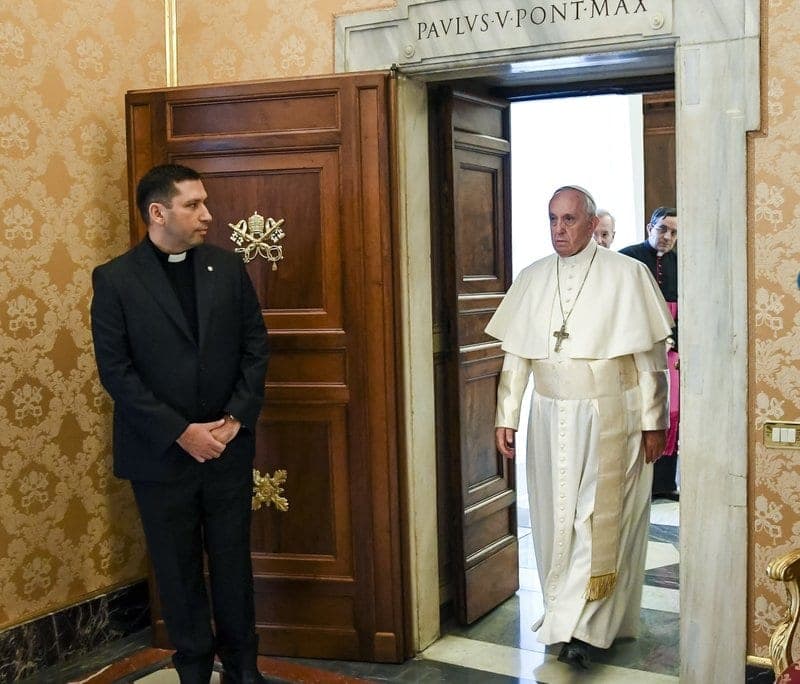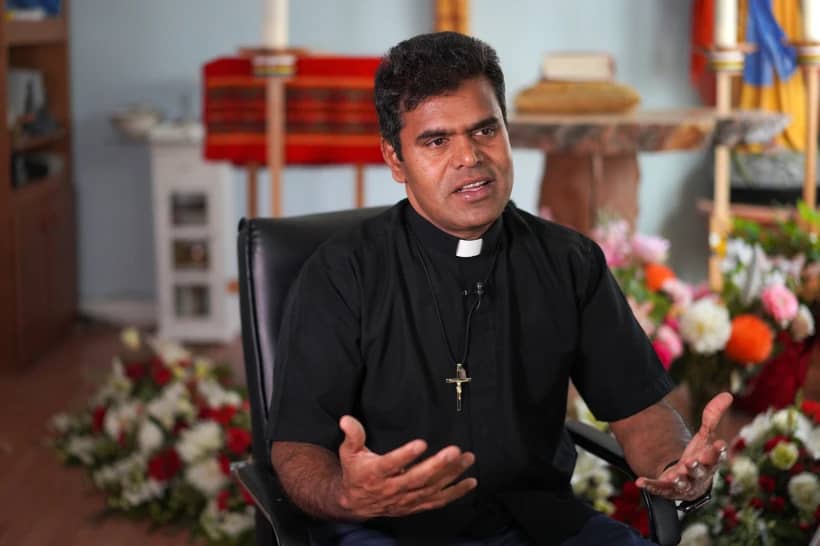A lay Catholic group in southern Chile that has opposed a bishop accused of sex abuse cover-up says revelations by The Associated Press that Pope Francis heard directly from a victim about the problem “brings an end to his ‘zero tolerance’ rhetoric.”
Juan Carlos Claret, a spokesman for Laicos de Osorno, said Monday that the pope and his subordinates must now answer the question of “who decided to constantly discredit the testimony of the victims.”
“It’s not possible to maintain, as some do, that the pope didn’t know and that he had slanted information,” Claret told the AP.
“Instead, we’re in the presence of a pope who had full knowledge of it all, and still decides to submit a community to unspeakable suffering.”
The AP reported on Monday that Pope Francis received a victim’s letter in 2015 that graphically detailed his sexual abuse and a cover-up by Chilean church authorities — contradicting the pope’s insistence that no victims had come forward.
AP obtained the letter from Chilean survivor Juan Carlos Cruz. Members of the pope’s sex-abuse advisory commission say they flew to Rome in 2015 specifically to hand-deliver the letter to a top papal adviser, Cardinal Sean O’Malley. Cruz and commission members say O’Malley assured them he had delivered it to the pope.
Francis recently sparked an outcry by vigorously defending Bishop Juan Barros, who was a protege of Father Fernando Karadima, a charismatic priest who was sanctioned by the Vatican in 2011 for sexually abusing minors.
Some of the victims allege that Barros witnessed the abuse, placing him at the scene when Karadima kissed and fondled minors.
Barros has denied knowing of the abuse or covering up for Karadima.
On the flight back from his recent visit to Chile and Peru, Francis said he had never heard from victims about Barros’s behavior.
“This is why I was shocked when I heard the Pope had said on the plane the Karadima victims had not come to him and he would listen if they did. I knew they had contacted him directly with this letter three years ago!” Marie Collins said in a Tweet.
Collins is an abuse survivor who resigned her position on the pope’s Commission for the Protection of Minors on March 1, 2017, citing a lack of cooperation from other Vatican offices.
The head of a U.S.-based group that has compiled a clergy abuse database said the revelations point to “inexcusable dysfunction at best and willful deception at worst.”
Anne Barrett Doyle is co-director of BishopAccountability.org. She said the “distressing and more likely explanation is that the pope lied.”
Crux staff contributed to this report.
******
Some key dates in the Barros affair:
Jan. 10, 2015
Pope names Barros, then head of Chile’s military diocese, as bishop of Osorno, over the objections of some members of the Chilean bishops’ conference. They were concerned about the fallout from the Karadima affair.
Jan. 31, 2015
Francis acknowledged the bishops’ concerns in a letter, which the AP obtained last month. The letter revealed a plan to have Barros and two other Karadima-trained bishops resign and take yearlong sabbaticals, but Francis wrote that it fell apart because the nuncio revealed it. The pope later acknowledged that he had blocked the plan himself because there was no “evidence” Barros was guilty of any cover-up.
February 2015
Fifty Chilean lawmakers and priests, deacons and more than 1,000 laity in the Osorno diocese sign petitions protesting Barros’s appointment and urging Francis revoke it.
Feb. 3, 2015
Juan Carlos Cruz writes an eight-page letter to the Vatican’s ambassador in Santiago, Monsignor Ivo Scapolo, accusing Barros of watching the sex abuse he experienced and doing nothing to stop it. The letter, which Cruz said should be considered a formal complaint, would form the basis of a subsequent letter to the pope.
March 21, 2015
The Mass installing Barros as bishop of Osorno is marred by violent protests. Black-clad demonstrators storm the church with signs that read, “No to Karadima’s accomplice.” Ten days later, the Vatican publicly defends Barros, saying it “carefully examined the prelate’s candidature and did not find objective reasons to preclude the appointment.”
April 12, 2015
Four members of the pope’s Pontifical Commission for the Protection of Minors fly to Rome to meet with Cardinal Sean O’Malley, Francis’s top adviser, to raise concerns about Barros’s suitability to run a diocese. The commissioners cite the victim testimony that Barros witnessed and ignored abuse. Member Marie Collins hands Cruz’s letter to O’Malley, who would go on to tell Collins and Cruz he delivered it to the pope and relayed their concerns.
May 15, 2015
Pope is filmed in St. Peter’s Square telling the spokesman for the Chilean bishops’ conference that the Chilean church had become too politicized and the opposition to Barros was coming from “leftists.” Francis says: “Osorno suffers, yes, from foolishness, because they don’t open their heart to what God says and they let themselves be guided by the nonsense all those people say.”
Jan. 15, 2018
Francis arrives in Chile to protests that are unprecedented for a papal visit. During his first public remarks, he apologizes for the “irreparable damage” suffered by all victims of sexual abuse. He meets with two survivors and weeps with them.
Jan. 18, 2018
While visiting the northern city of Iquique, Francis is asked by a Chilean journalist about Barros and says: “The day they bring me proof against Bishop Barros, I’ll speak. There is not one shred of proof against him. It’s all calumny. Is that clear?”
Jan. 20, 2018
Cardinal O’Malley publicly rebukes the pope, saying his words in Iquique “were a source of great pain” for abuse survivors. “Words that convey the message ‘if you cannot prove your claims then you will not be believed’ abandon those who have suffered reprehensible criminal violations of their human dignity and relegate survivors to discredited exile,” O’Malley said.
Jan. 21, 2018
Francis partially apologizes, saying he shouldn’t have used the word “proof” but rather “evidence.” During an in-flight news conference, he repeats that accusations against Barros are “slander” and denies any victims had come forward accusing Barros of covering up for Karadima. “I’m convinced he’s innocent.”
Feb. 5, 2018
The AP reports the contents of Cruz’s letter, which contradict the pope’s claim about no victims coming forward. Cruz wrote: “Holy Father, it’s bad enough that we suffered such tremendous pain and anguish from the sexual and psychological abuse, but the terrible mistreatment we received from our pastors is almost worse.”









